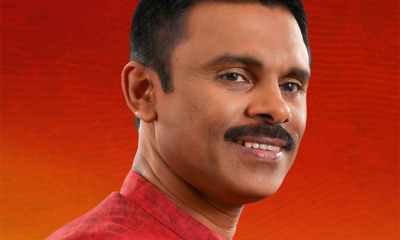News
Sectoral Oversight Committee exposes CEB costing trick to make huge profits

By Rathindra Kuruwita
The Ceylon Electricity Board (CEB) has significantly overestimated the cost of electricity production and transmission for 2024 and this is reflected in their estimated cost of production, says MP Gamini Waleboda, head of the Sectoral Oversight Committee on Alleviating the Impact of the Economic Crisis.
The overestimation is around Rs 140 billion, Waleboda has said, adding that the CEB has recently presented the estimated costs for 2024 to the Public Utilities Commission of Sri Lanka (PUCSL).
“When we look at the cost of production, we see that it has been overestimated by about Rs 80 billion,” he said.
MP Waleboda said that the CEB had also increased the estimated cost of transmission. Over 98 percent of households were connected to the national grid, he said.
“If you look at the cost of transmission in the recent past, it has hovered between 55 and 67 billion rupees. The cost of Rs 67 billion was when we were dramatically expanding the coverage. Now, the network is mature. This year the CEB says the cost of transmission is Rs 132 billion rupees,” he said.
MP Waleboda said that CEB had also significantly overestimated the cost of financing. The CEB’s calculation ran counter to the principles of accounting, he said.
“They have calculated the interest rate using the rates that were prevalent at the height of the economic crisis. This has to decrease. The CEB has also calculated depreciation of assets that have been fully depreciated. This is imaginary expenditure. There are many instances of double counting. The CEB has no proper cost accounting mechanism and therefore officials and policy makers parrot out numbers that someone comes up with,” MP Waleboda said.
Waleboda said the minister of power and energy, Kanchana Wijesekera and senior CEB officials had taken the recommendations of the Sectoral Oversight Committee on Alleviating the Impact of the Economic Crisis as a personal affront.
“We are actually trying to help him because the minister needs correct data to make the right decisions. The overestimation is around Rs 140 billion. In 2023, the CEB made a profit of over Rs 50 billion. It made a monthly profit of about Rs 15 billion rupees in January and February 2024.”
Waleboda said the CEB and the Ceylon Petroleum Corporation (CPC) were now profit-making enterprises. However, they were making profits at the expense of macroeconomic sustainability. The two institutions have gone beyond the breakeven point and are now making tens of billions of rupees in profit, the MP said.
“However, the social and macro-economic impact have been adverse. The education of millions of children is adversely affected when a million households are taken off the grid. The manufacturing and agricultural sectors are suffering because of high power and energy costs. To make the CEB profitable, we have undermined our macroeconomic stability, economic expansion, and social wellbeing,” he said, noting that the government must take a holistic view of the economy. The CEB is a part of a wider system and if everything else collapses, the CEB can only last for a short period, he said.
The Sectoral Oversight Committee on Alleviating the Impact of the Economic Crisis had met representatives of organisations that earned foreign currency and all manufacturers that produced for the domestic market, he said.
“We are not asking the CEB to continue supplying electricity below cost. We are asking the government to help our manufacturers and the poorest segments. If we ignore the tragedy that unfolds among the lowest strata of society, we will only be asking for a massive social crisis in the coming years,” Waleboda said.
The MP said the Central Bank (CBSL) could do a lot more to help the economy. The CBSL was implementing IMF policies, and losing its grip on the financial sector, Waleboda said.
“Financial institutions are paying a single digit interest for savings, but the interest rates for borrowing are in double digits, over 16 percent in many cases. The banks are making tremendous profits. The CBSL has reduced policy rates several times, but the banks have not passed the benefit on to borrowers. Not even state banks are reducing their loan interests,” he said.
However, the CBSL had played a pivotal role in controlling and reducing inflation which was around 70% in late 2022, Waleboda said.
“There is a lot of talk on making the CBSL independent. This should not mean it should carry out the IMF or ADB programme or act according to the whims of the few people on the monetary board. The CBSL must come up with a monetary policy that is sustainable in the long term and leads to economic development,” MP Weleboda said, noting that according to their calculations millions of US dollars that should be brought back to Sri Lanka are parked in foreign countries by exporters. “The country loses at least 1.2 billion dollars a year because of this, and this is around the income generated by the IT industry”, he said, “There should be an institution to keep a tab on these things.”
News
US sports envoys to Lanka to champion youth development

The U.S. Embassy in Colombo welcomed the U.S. Sports Envoys to Sri Lanka, former National Basketball Association (NBA) and Women’s National Basketball Association (WNBA) players Stephen Howard and Astou Ndiaye, from June 8 through 14.
The Public Diplomacy section of the U.S. Embassy said that it would launch a weeklong basketball program intended to harness the unifying power of sports, made possible through collaboration with Foundation of Goodness and IImpact Hoop Lab.
While in Sri Lanka, Howard and Ndiaye, both retired professional basketball players, will conduct a weeklong program, Hoops for Hope: Bridging Borders through Basketball. The Sports Envoys will lead basketball clinics and exhibition matches and engage in leadership sessions in Colombo and Southern Province for youth aged 14-18 from Northern, Uva, Eastern and Western Provinces, offering skills and leadership training both on and off the court. The U.S. Envoys will also share their expertise with the Sri Lanka Basketball Federation, national coaches, and players, furthering the development of basketball in the country. Beyond the clinics, they will collaborate with Sri Lankan schoolchildren to take part in a community service project in the Colombo area.
“We are so proud to welcome Stephen and Astou as our Sports Envoys to Sri Lanka, to build on the strong people-to-people connections between the United States and Sri Lanka,” said U.S. Ambassador Julie Chung. “The lessons that will be shared by our Sports Envoys – communication, teamwork, resilience, inclusion, and conflict resolution – are essential for leadership development, community building, equality, and peace. The U.S. Sports Envoy program is a testament to our belief that sports can be a powerful tool in promoting peace and unity.”
News
Rahuman questions sudden cancellation of leave of CEB employees

SJB Colombo District MP Mujibur Rahuman in parliament demanded to know from the government the reasons for CEB suspending the leave of all its employees until further notice from Thursday.
MP Rahuman said that the CEB has got an acting General Manager anew and the latter yesterday morning issued a circular suspending leave of all CEB employees with immediate effect until further notice.
“We demand that Minister Kanchana Wijesekera should explain this to the House. This circular was issued while this debate on the new Electricity Amendment Bill was pending. There are many who oppose this Bill. The Minister must tell parliament the reason for the urge to cancel the leave of CEB employees,” the MP said.However, Speaker Mahinda Yapa Abeywardena prevented Minister Wijesekera responding to the query and said that the matter raised by MP Rahuman was not relevant.
News
CIPM successfully concludes 8th Annual Symposium

The Chartered Institute of Personnel Management (CIPM) successfully concluded the 8th Annual CIPM Symposium, which took place on 31st May 2024. Themed “Nurturing the Human Element—Redefining HRM in a Rapidly Changing World,” the symposium underscored the pivotal role of human resource management (HRM) in today’s dynamic global landscape. Since its inception in 1959, CIPM has been dedicated to advancing the HR profession through education, professional development, and advocacy, solidifying its position as Sri Lanka’s leading professional body for HRM.
Ken Vijayakumar, the President of the CIPM, graced the occasion as the chief guest. The symposium commenced with the welcome address by the Chairperson, Prof. Arosha Adikaram, followed by the Web Launch of the Symposium Proceedings and Abstract Book by the CIPM President. The event featured distinguished addresses, including a speech by Chief Guest Ken Vijayakumar, President of CIPM, and an address by Guest of Honor Shakthi Ranatunga, Chief Operating Officer of MAS Holdings Pvt. Ltd., Sri Lanka.
The symposium also featured an inspiring keynote address by Prof. Mario Fernando, Professor of Management and Director of the Centre for Cross Cultural Management (CCCM) at the University of Wollongong, Australia.
Vote of Thanks of the inauguration session was delivered by Dr. Dillanjani Weeratunga, Symposium Co-chair.
The symposium served as a comprehensive platform for researchers to present their findings across a wide range of critical topics in HRM. These included Cultural Diversity and Inclusion, Talent Development and Retention, Ethical Leadership and Corporate Social Responsibility, Adapting to Technological Advancements, Mental Health and Well-being at Work, Global Workforce Challenges, Employee Empowerment, and Reskilling and Upskilling.
The plenary session was led by Prof. Wasantha Rajapakse. Certificates were awarded to the best paper presenters during the valedictory session, followed by a vote of thanks delivered by Kamani Perera, Manager of Research and Development.
The annual symposium of CIPM was a truly inclusive event, attracting a diverse audience that spanned undergraduates, graduates, working professionals, research scholars and lecturers. This widespread interest highlights the symposium’s significance in the field of HRM, offering a unique opportunity for everyone to network and learn from scholarly brains.The CIPM International Research Symposium was sponsored by Hambantota International Port, Sri Lanka Institute of Information Technology (SLIIT), E B Creasy & Co. PLC, and Print Xcel Company.
















